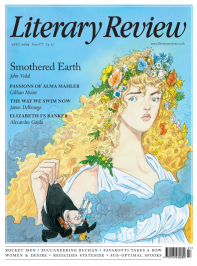Eric Ormsby
Straw Men in Mufti
Useful Enemies: Islam and the Ottoman Empire in Western Political Thought, 1450–1750
By Noel Malcolm
Oxford University Press 487pp £25
During the long nights of the second Ottoman siege of Vienna in 1683, the Viennese were unnerved by the nightly scratching and chipping of the Turkish sappers, seemingly just under their floorboards, as they worked to plant mines to force a breach in the walls. The siege failed and the Grand Vizier Kara Mustafa, commander of the Ottoman forces, paid the price for his failure: he was strangled by janissaries with a bowstring. But something akin to that spooky and ominous scratching seems to have rattled the minds of some of the greatest European political thinkers, from the fall of Constantinople in 1453 under the forces of Sultan Mehmed II to the mid-18th century. The Ottomans who preoccupied these thinkers – ranging from Machiavelli to Montesquieu – may have been as invisible as the Turkish sappers, but they loomed large in theories of state. And yet, as Noel Malcolm shows in this brilliant and densely detailed study, the Turks were as useful to European thinkers as they were menacing.
The fall of Constantinople provoked widespread alarm. The city of the Emperor Constantine, the first Roman ruler to give Christianity official status, was now in the hands of ‘infidel’ Turks, believers in an aberrant faith promulgated centuries before by that arch-impostor the Prophet Muhammad. Never mind that the Christians

Sign Up to our newsletter
Receive free articles, highlights from the archive, news, details of prizes, and much more.@Lit_Review
Follow Literary Review on Twitter
Twitter Feed
Although a pioneering physicist and mathematician, Blaise Pascal made it his mission to identify the divine presence in everyday life.
Costica Bradatan explores what such a figure has in common with later thinkers like Kierkegaard.
Costica Bradatan - Descartes Be Damned
Costica Bradatan: Descartes Be Damned - Blaise Pascal: The Man Who Made the Modern World by Graham Tomlin
literaryreview.co.uk
The era of dollar dominance might be coming to an end. But if not the dollar, which currency will be the backbone of the global economic system?
@HowardJDavies weighs up the alternatives.
Howard Davies - Greenbacks Down, First Editions Up
Howard Davies: Greenbacks Down, First Editions Up - Our Dollar, Your Problem: An Insider’s View of Seven Turbulent...
literaryreview.co.uk
Johannes Gutenberg cut corners at every turn when putting together his bible. How, then, did his creation achieve such renown?
@JosephHone_ investigates.
Joseph Hone - Start the Presses!
Joseph Hone: Start the Presses! - Johannes Gutenberg: A Biography in Books by Eric Marshall White
literaryreview.co.uk